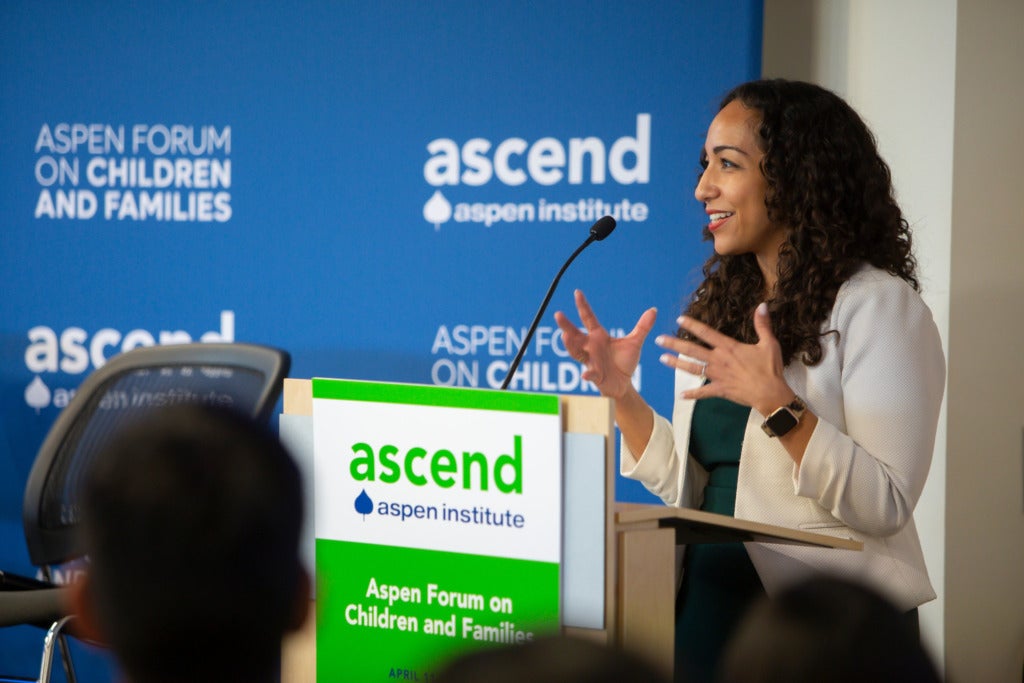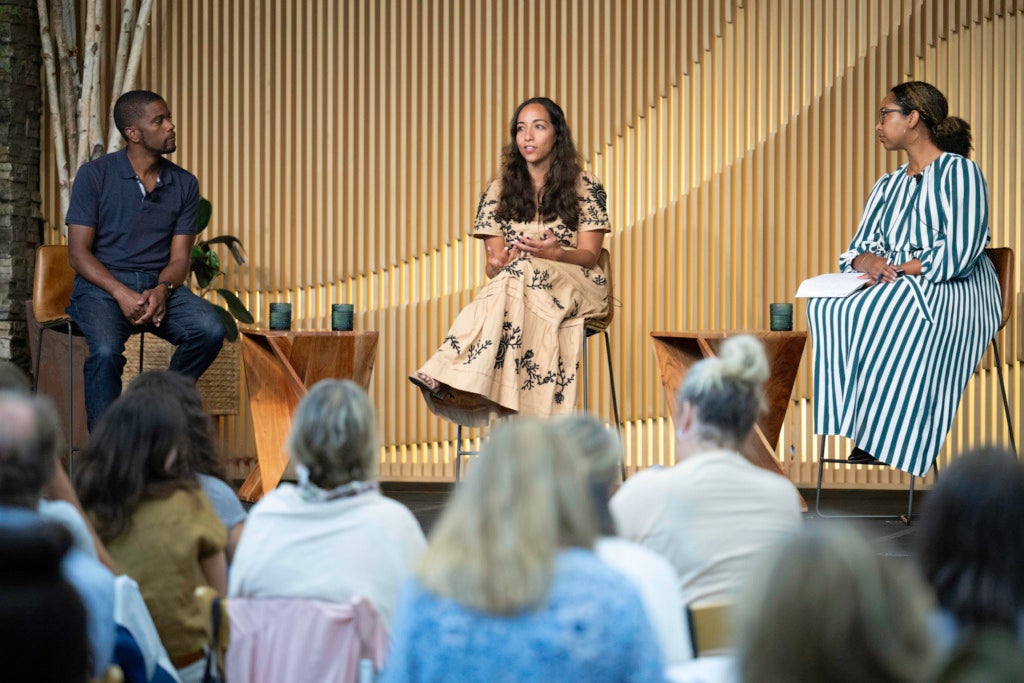Layla Zaidane is the President and CEO of Future Caucus, a DC-based organization dedicated to helping young lawmakers cross the aisle and forge bipartisan legislation. With chapters in 34 states and Future Caucus members in Congress, Zaidane is leading the 10-year-old organization from a convening body to something more like “a policy accelerator.” An Aspen Ideas Fellow in 2018, an Ascend Fellow in 2021, and currently a Civil Society Fellow, Zaidane is using her Aspen affiliation to work toward something that can feel vanishingly rare in the current political scene. We sat down with her to learn more about why young lawmakers are especially suited to crafting bipartisan legislation and how she stays hopeful in divided times.
How did you push Future Caucus forward through your Ascend Fellowship?
Part of the premise of Ascend is that you have to have a quantum leap idea and mine was something called the Innovation Lab. Future Caucus’ work was about helping to activate the next generation of elected leaders to bridge partisan divide and transform American politics. And we did that by getting them together, helping young lawmakers connect and then hoping that they would go off and write bipartisan laws.
The Innovation Lab’s vision was to see if Future Caucus could build a policy accelerator, so not just get people together, but to actually host working groups, provide resources and tools and expertise to actually catalyze lawmakers to co-create bridge-build new solutions. The accelerator is designed to take some of these collaborative tendencies we see in young lawmakers and actually match them up with policy solutions.

Layla Zaidane, President & CEO of Future Caucus and Ascend Fellow.
How do you define young lawmakers?
We say 45 and under. If you’re walking around a college campus, then 45 might feel old. But in the US Congress, where the average age is in the 60s, 45 is a generation younger than a lot of the people who work there—and often people who haven’t yet calcified into some institutional bad habits. Future Caucus was actually founded as the Millennial Action Project. Now, in 2013 when we started, millennial and young were synonymous. Now that some Millennials are in their 40s, they’re not.
What kind of temperamental or behavioral or maybe sociological tendencies have you seen in younger lawmakers that distinguish them from their elders in Congress and state legislatures?
I think younger people feel a sense of urgency to solve big problems. They’re not ossified in status quo thinking, and they’re willing to work with whoever to get the thing they want to do done. Only 25% of state lawmakers are considered young, but 40% of bipartisan laws enacted were written by young people. They’re overperforming at building coalitions and working outside of the pure partisan structure.
Are there certain policy concerns that you’ve seen young lawmakers consistently take up?
That’s a big question we asked when getting Innovation Lab going during Ascend–what issues will we focus on? We asked members and then looked at the data and tried to figure out what’s actually happening. The Venn diagram of those two data sets landed on six core issue areas.
Healthcare, with a lot of emphasis on maternal health, childcare, mental health, and perhaps reflecting the concerns of a younger set of people or the pandemic, telehealth.
Housing was a bright flashing light. Criminal justice reform, which has historically been a bipartisan issue. The future of work, including workforce development, apprenticeships, and questions on the role AI and technology in shaping the future of work. Energy and the environment are big bipartisan concerns among young people.
And finally, modernizing democracy, whether that’s with digital records, making the user experience of engaging with the government easier.
What are some of the big legislative wins that you can tie back to lawmakers’ engagement with Future Caucus?
There are a bunch! There’s an incredibly powerful story of how the Mississippi Future Caucus was able to work together to remove confederate iconography from the state flag. In Arkansas, two women came together to pass the Crown Act to prevent hair discrimination.
In Kansas, two legislators became friends first through Future Caucus programming. They got to know each other and then worked together to pass a piece of housing legislation.

Layla Zaidane, President & CEO of Future Caucus and Ascend Fellow (center) with St. Paul, Minnesota Mayor and Ascend Fellow Melvin Carter (left) and Gillian White, Chief Revenue Officer at Capital B (right) at VisionXChange.
What kind of systemic or entrenched issues do you see working against the kind of bipartisanship that Future Caucus promotes?
One place you see bipartisanship struggle is in primary elections, where lawmakers can get painted by a primary opponent as not Republican or not Democrat enough because of positions they take or work they’re doing across the aisle. The fastest growing political affiliation in the US is independent or unaffiliated. The idea of choice is really important to young people, but our system is binary. Because our primary system doesn’t allow for the full expression or nuance of our political views and reduces the pool of voters to the most ideologically pure, it hurts bipartisanship.
To many, our political scene feels more polarized than at any point they can remember. How do you stay optimistic?
It’s in the founding documents—a more perfect union. We’re a country in constant pursuit of improvement. That’s the American Dream. That’s why my parents immigrated from Morocco. I think the frustration and disillusionment comes when there’s such a wide gap between dream and reality. But we take a deficit mindset when we talk about our system and it comes from a sense of what’s broken versus what’s possible. I think we don’t spend enough time coming at the American experience from an asset framework.

